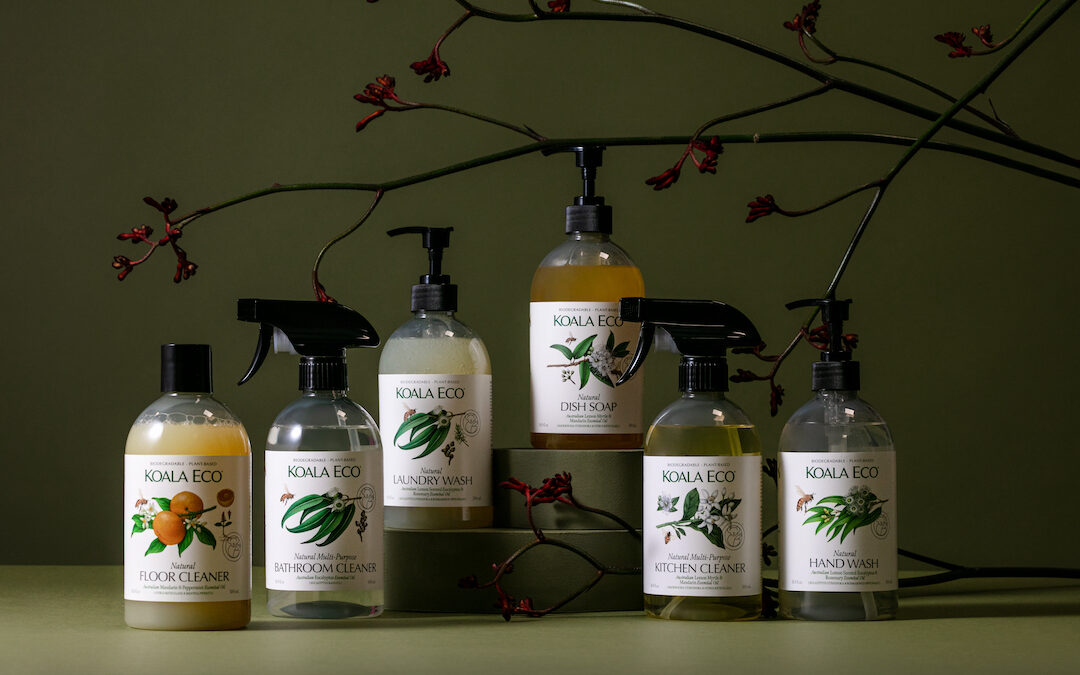We spoke to Koala Eco co-founder Jessica Bragdon about the importance of sustainability and keeping in touch with nature.
You founded Koala Eco in 2017. Can you tell me a bit about your backgrounds and the inspiration behind the brand?
I’m originally from the United States, I grew up in Boston and New Hampshire with my twin sister and younger brother. When we were just out of university, my sister Adrienne (Dee) and I started up and ran a floral business, designing and making arrangements for nightclubs and restaurants all over Boston. We sold it, and moved to New York City to attend graduate school at Columbia University. While in NYC studying, we also worked for the group that started the Maritime Hotel and The Bowery Hotel. It was during that time that I met Paul, who’s a born and bred Western Australian. Paul is a CA and worked in London and was working for KPMG in NYC.
I was always strongly influenced by my grandmother, who would take Dee and me on long hikes through the forests around her New England home, pointing out the flora and fauna along the way. Paul grew up in the country on a sheep and wheat farm in WA. So when we got together, and especially when we started our family, it was our shared preference to use natural remedies and solutions as part of our household routines and lifestyle. We looked for safe, non-toxic household cleaning products that also worked well, but we couldn’t find what we wanted, so we decided to start a company to make plant-based products for the home and body, using beautiful aromatic essential oils from Australian native botanicals.
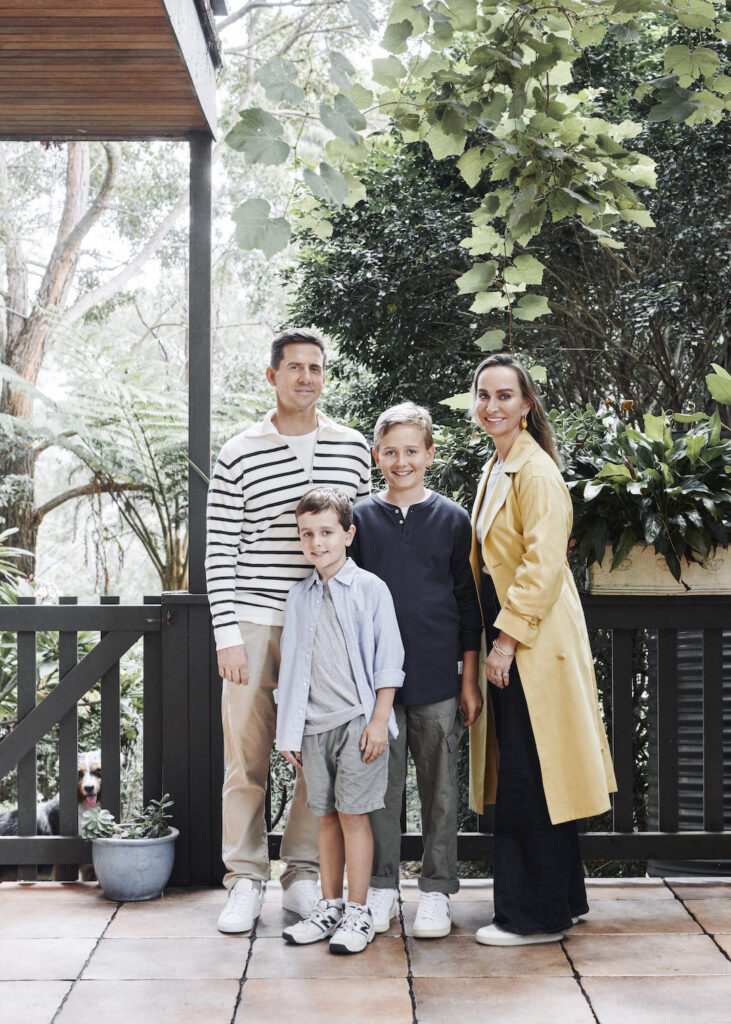
Paul, Jessica and their two kids. Image: supplied.
The main focus of Koala Eco is safe, natural and sustainable products. How has your product range and formulas developed over the years?
In terms of the fundamentals—plant-based, 100% pure essential oils primarily from Australian native plants, biodegradable, not tested on animals, and so on—nothing has changed. Our range has broadened considerably, however. We started by launching cleaning products for the home and laundry and then introducing products for the body. Since then, we’ve released spray mists for rooms and linen, hand and surface sanitisers and even a Natural Dog Wash with Sweet Marjoram and Rosalina essential oil. And we are constantly working with our chemists and lab to develop further products, so quite a few are currently being perfected.
Our products are not just about the effective and safe formulas but also about the therapeutic benefits of the essential oils they contain. We’ve been focusing on ideas that help people to connect with nature in other meaningful ways in the home and products that support the creation of a restful environment in places like the bedroom. For example, one of our recent additions to the range is a Natural Pillow and Linen Spray using the essential oils of nature’s three best stress-relieving and anti-inflammatory botanicals: Eucalyptus, Peppermint, and the beautifully aromatic Australian bush lavender, Rosalina.
You also aim not to just ‘do no harm’ but to ‘do better’ for the planet. Why is sustainability so important to you?
Well, primarily because there is no Planet B. We don’t want to use or do anything that harms our loved ones or the planet, and we want to be, and our products to be, transparent about this. We’re making products developed from nature for nature, and we think we’re offering people a strong alternative to the usual choices. The more people embrace these choices, the less harm we’re likely (as individuals and collectively) to do to our planet.
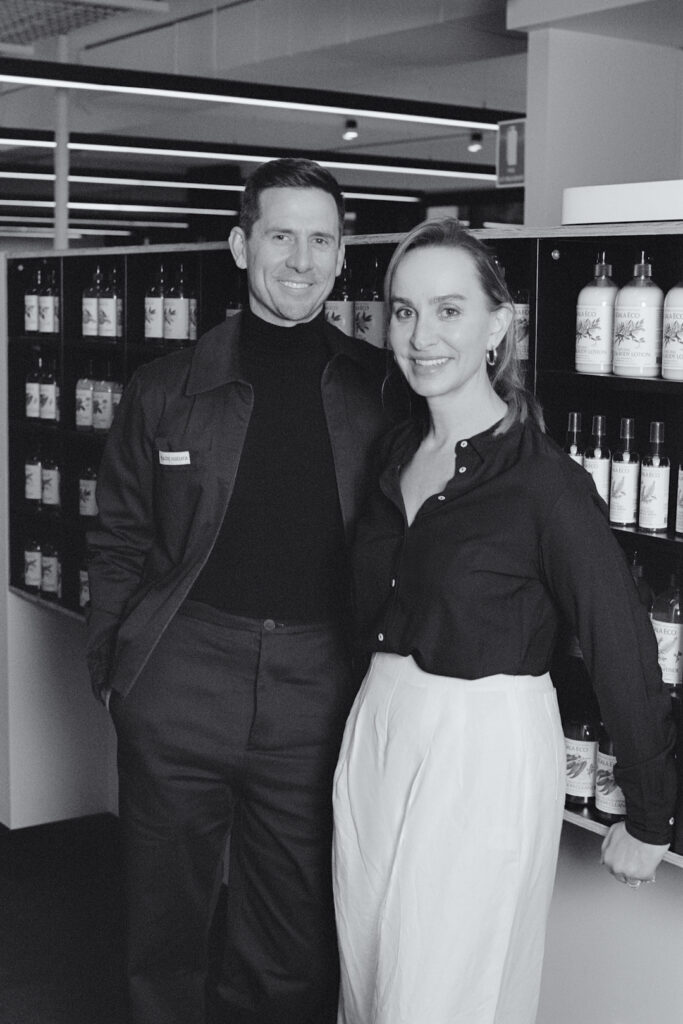
Jessica and Paul. Image: supplied.
What are you most proud of with Koala Eco?
It’s still a special moment to remember when we launched our first product, our Natural Multipurpose Kitchen Cleaner with Lemon Myrtle and Mandarin. We worked so hard with our chemists and labs to make a real winner to launch our company, and it’s been one of our top sellers ever since.
We were also overjoyed when we campaigned successfully in 2018 to move to 100% recycled and recyclable rPET bottles for our packaging, so Koala Eco is not responsible for causing new plastic to be made for any of our bottles. Our bottles are made entirely from rPET collected locally and shipped to you in a recycled cardboard box. rPET plastic is entirely recycled and recyclable. We also offer concentrates, glass bottles and refills.
On a more philosophical level, we’re proud that Koala Eco was one of the first businesses to be invited to re-badge as a dot-eco company by the Vancouver-based dot-eco movement, launched by two former United Nations Environment Programme staffers. And every Koala Eco product sold triggers a donation to One Per Cent for the Planet, an environmental group committed to protecting land, forests, rivers and oceans. We became the principal sponsor for the People & Parks #NaturePact campaign. Now in its fourth year, #NaturePact encourages people, businesses, schools, and organisations to commit to spending intentional time in nature daily for a month; to reap the transformative mental health benefits to your mood, energy, and well-being.
What has been one of the most unexpected challenges you’ve faced?
Hmmm, that’s an interesting one. Some of the challenges have not been so unexpected: like maintaining work-life balance, and in the early days, running the business at home and negotiating proper family time. If I’m honest, I guess we didn’t expect Koala Eco to take off quite as quickly as it did. Launching in 2017 proved to be excellent timing in terms of a much more eco-conscious trend developing among communities and consumers worldwide. It was fantastic, however, we had to pull out all the stops to keep up while also holding true to our brand integrity: if we weren’t satisfied that a product was going to be a top cleaning performer as well as planet-friendly, then we had to keep going back to the lab until it was. If it meant delaying a launch, then too bad.
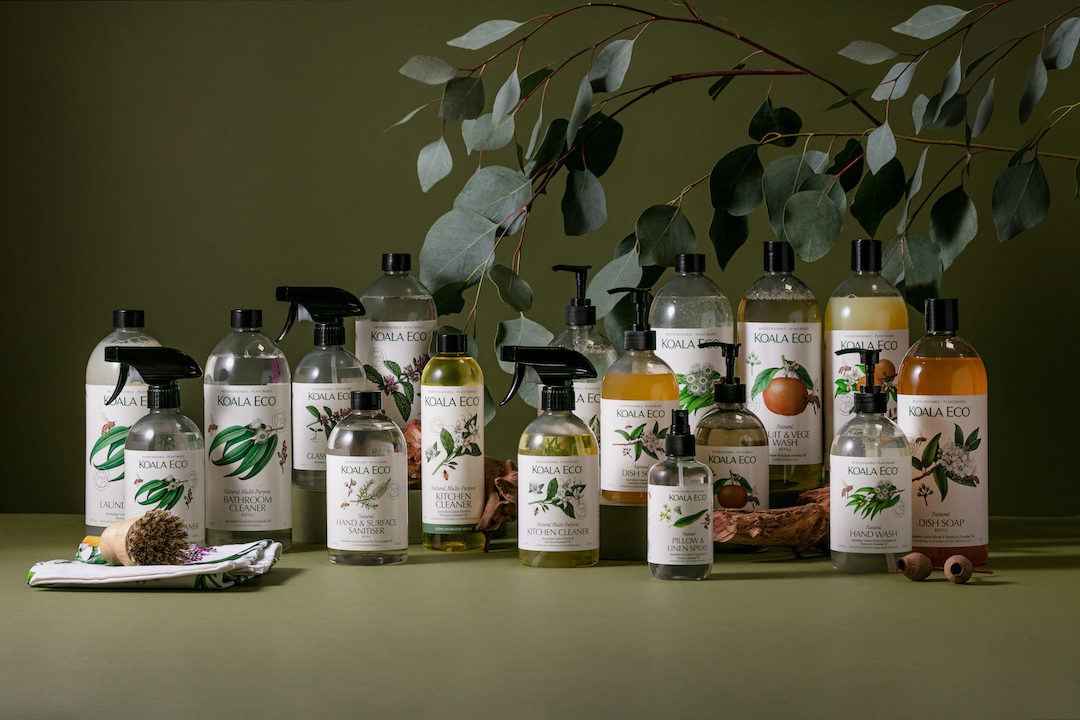
Koala Eco products. Image: supplied.
Covid-19 certainly brought a new focus to hygiene and cleaning products. How was your business affected by the pandemic?
Our core business is online, so people thankfully could access our products whether or not they were in lock-down. We released surface sanitiser sprays that were independently lab-tested, and proved to have the capacity to kill 99.9% of germs when used as directed, so perhaps that helped to make life in isolation a little easier for some.
There’s no getting away from the fact that for at least two years before the world learned to handle ‘living with’ COVID-19, this was a really challenging time for people’s mental health. Perhaps an upside of those dark times was that the virus helped people realise good hygiene can mean so much more than cleanliness; it’s a way of helping to prevent the spread of germs and, when we clean and care for our homes with products made from naturally derived ingredients and essential oils, it’s a form of self-care that impacts not only on physical but also mental health. Health awareness has probably never been more prevalent thanks to these extraordinary circumstances the whole world was experiencing.
Why is it important for people to connect with nature?
Connecting with nature is one of the easiest, cheapest and most meaningful ways to invest in personal wellbeing. It’s medicine. And it’s a reciprocal thing: if we care for nature, nature cares for us.
Our company mantra is essentially ‘More Nature, Feel Better,’ and our purpose is to help people bring more nature into their everyday lives. One easy way is to use household and personal care products that not only are made from nature, but are also environmentally friendly, and don’t harm nature.
In 2021 Koala Eco started paying our team members to spend two hours a week in nature, intentionally doing something connected to the natural world that feels particularly healing, and is not about routine things like exercise. They can do whatever they want, share the experience or photos with us, so that we can then share it with the wider Koala Eco community on social media. We also started talking to well-known people around the world whom we believe genuinely live and breathe a nature-focused lifestyle because it brings healing, beauty, peace, and meaning to their lives. We ask them to share their ‘hours in nature’, so that they can inspire some of ours, too.
Henry David Thoreau, author of Walden; or a Life in the Woods got it absolutely right when he wrote ‘We need the tonic of wildness…[w]e can never have enough of nature.’ Immersion in nature is a deeply spiritual, enriching and sustaining experience. Of course, this is something that the First Nations peoples of the world have always practised and understood.
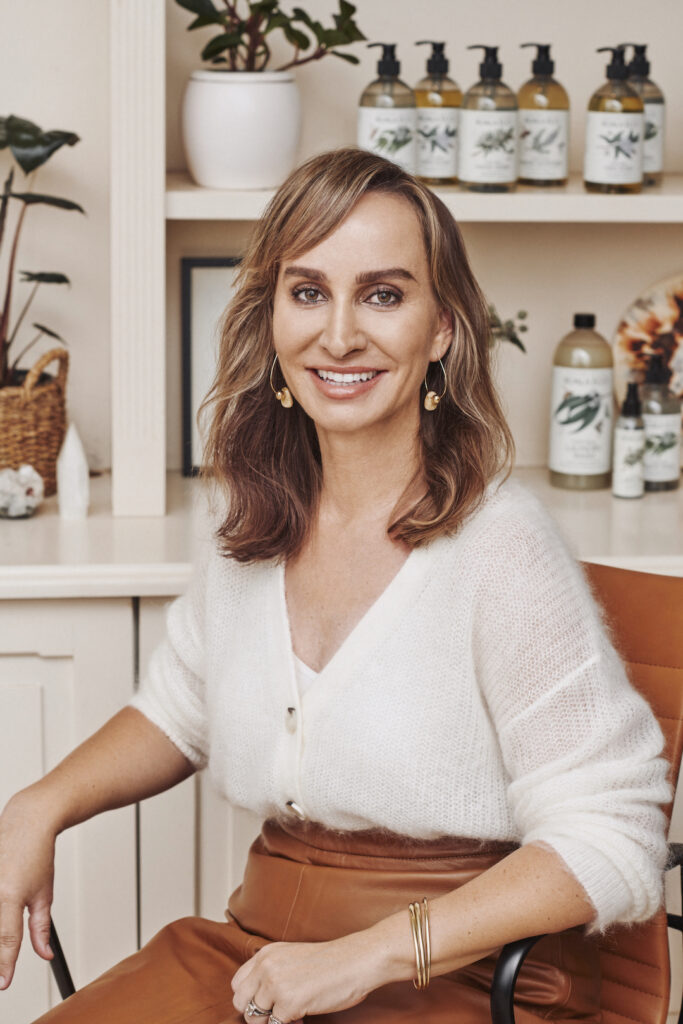
Jessica Bragdon, Koala Eco Cofounder. Image: supplied.
What is next for Koala Eco?
We’re continuing to research and develop products in the lab, so lots of work in that area. During 2023 we’re formally launching the business in the United States, under the management of my sister Dee (so that’s involving a lot of travel between Australia and California).
And we are continuing to focus on ways of spreading the word about the mental and physical health benefits of caring for and connecting with nature, and sponsoring initiatives that help make that happen. For example, to support our set-up Stateside, we recently became a sponsor of the Oceanic Society’s Critter Scholars Program, which helps disadvantaged teenagers get up close to and learn about marine wildlife.
Where is your favourite place to travel to in Australia?
From our home in Sydney it’s about a five-hour drive south to Eurobodalla National Park. Along the highway grows Queen Anne’s Lace (or Wild Carrot to give it its more prosaic name!). It reminds me of my childhood summers in New England. We also love heading back to Western Australia, and visiting family as well as the Margaret River Region. Prevelly Beach is just pure heaven!
For more interviews with exciting Australian business owners, check out our chat with Keri Algar from Soltera Rum.

